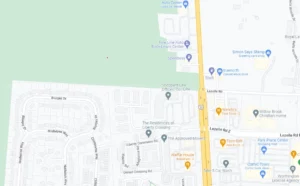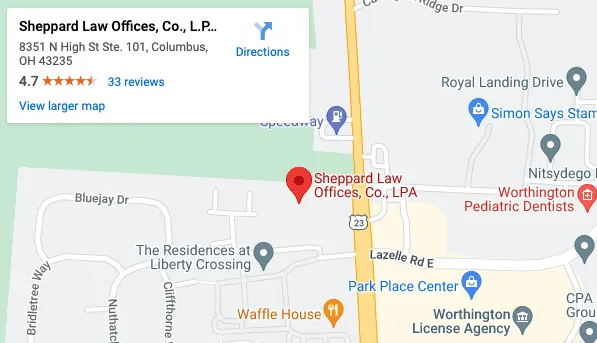Secure Your Legacy With Our Ohio Probate Attorneys
Probate can be confusing and overwhelming after the loss of a loved one. It is in place to ensure that the estate of a deceased person is distributed according to his or her wishes. This process varies in complexity depending on the facts of each case, but no matter how complex the case is, a Columbus probate lawyer can be your trusted guide.
A probate attorney in Ohio can help you navigate the legalities, protect your rights, and achieve a smooth and efficient resolution for your family’s well-being.
Quick Summary:
- Probate is necessary when someone dies, and their assets are only in their name, but assets owned by others or with named beneficiaries skip probate.
- Many people use living trusts to avoid probate. The time it takes to process an estate depends on its size, and a probate attorney can help choose the proper process.
- The probate process involves more than just following a valid will. It also includes appointing an executor, posting bonds if needed, finding assets, assessing their value, paying debts and taxes, and distributing assets.
- With a will, the court executes it by appointing an executor, paying debts, and distributing assets. Probate is more complex without a will, and it handles different estate sizes.
- Wills and trusts are fundamental for planning, and a lawyer can help with drafting. Probate courts also handle guardianship, name changes, and birth certificate corrections.
What is Probate?
Probate is the court-supervised legal process that oversees the administration of a deceased person’s estate. This includes:
- Validating the will (if there is one)
- Identifying and appraising assets
- Paying off debts and taxes
- Distributing remaining assets to beneficiaries
Probate ensures the deceased’s wishes are followed (as outlined in the will) and their financial affairs are settled appropriately.
Is Probate Necessary?
The probate court is needed to properly govern an estate. If a person dies with assets in their name, the court must manage them.
If joint assets are listed beneficiaries on an account, they do not go through probate. Since probate courts rarely administer trust assets, many persons form a living trust.
Different probate methods depend on estate size and worth. Smaller estates may take weeks or days to go through probate, whereas full administrations can take six to nine months. A probate attorney can advise you on the appropriate probate process.
Understanding the Probate Process:
Going through probate is far more complex than simply abiding by an authenticated Last Will and Testament. It can seem needlessly complex if you have never gone through the probate process. Here’s the breakdown of the probate process:
Authenticate Will & Testament
The decedent’s will must be authenticated by probate court first. Any Will beneficiary and potential estate heir can attend the probate court hearing to share their viewpoint. If no interested parties object, the Will is authentic and the process can continue.
If one or more parties object to the Will’s admission, a probate lawyer can help resolve the disagreement legally. After this issue is resolved, the Will is authenticated and the process continues.
Appoint Executor
Will-named executors handle the probate process. A probate court appoints an estate administrator without a Will. An executor or administrator must petition the court to be the estate’s fiduciary. Probate judges usually appoint family members as executors or administrators. Again, interested parties may oppose the executor or administrator.
Post Bond (if necessary)
If the fiduciary makes a mistake settling the estate, a bond may be necessary to protect the estate. Nearly all Wills waive bond requirements. The fiduciary would need no bond. If the Will doesn’t waive the bond, the probate judge may require the executor to deposit a bond before proceeding.
Locate Assets
A complete asset list is needed to determine the estate’s value. Currently, a probate attorney will help the fiduciary find estate assets. In complete administration, the executor or administrator must report estate assets and obligations to the probate court.
Assess Value
Once the estate’s assets are identified, the probate court will demand their values. The court may appoint an appraiser to value the estate’s personal and real property.
Identify & Pay Debts
Now that we know the estate’s value, we must find its remaining debts at death. A probate lawyer helps fiduciaries locate debts. Next, notify creditors of the death. Ohio creditors have six months from the decedent’s death to submit a claim before it’s forever prohibited.
File Taxes
Executors and administrators must prepare and file the decedent’s last income tax returns. At the estate owner’s death, the fiduciary must pay income, property, and other taxes. Probate lawyers can use their tax law knowledge to assist you in preparing, filing, and appealing estate taxes.
Distribute Assets
After paying estate debts and taxes, the executor or administrator distributes the remaining assets to beneficiaries. The certified Last Will and Testament distributes net assets. The probate court requires a partial or final accounting from the executor or administrator.
Streamline Your Inheritance: Essential Information About Probate
The probate court oversees the legal process of administering a deceased person’s estate, ensuring their wishes and financial affairs are settled. Here’s a breakdown of some everyday probate matters:
Estate Administration
When a loved one passes, probate and estate administration come into play. Below are some key points:
- With a Will: When a valid will exists, the court oversees its execution. This includes choosing an executor, paying debts and taxes, and distributing assets according to the will.
- Without a Will (Intestacy): The procedure becomes more complicated. Following Ohio’s intestacy statutes, the court chooses an administrator and distributes assets to heirs.
- Small Estates: Simplified procedures often apply to estates below a specific value threshold set by Ohio law. This can streamline the process and reduce costs.
- Large Estates: Complex estates with significant assets may require a more involved probate process with additional legal and financial considerations.
Wills and Trusts: Essential Estate Planning Tools
Decisions must be made once a loved one dies. Estate planning instruments like wills and trusts provide clarity and control. Understanding both helps you plan your family’s future.
- Importance of Having a Will: A will offers clarity and control. It lets you name beneficiaries, an executor, and asset distribution instructions.
- Basics of Wills and Trusts: Wills go into effect upon death, while trusts can manage assets during life and after death. Understanding their differences is crucial for effective estate planning.
- Finding an Attorney to Draft a Will or Trust: A skilled attorney can help you create legally sound documents representing your wishes.
Beyond Estate Administration: Probate courts also handle other matters:
While probate focuses on settling a deceased’s financial affairs, probate courts also handle a broader range of matters, including:
- Guardianship: Establishing legal oversight for a minor or incapacitated person.
- Name Change: Legally modifying an individual’s name.
- Birth Certificate Correction: Addressing errors or discrepancies in a birth certificate.
Why Do I Need a Columbus Probate Lawyer?
Ohio doesn’t require lawyers for estate probate. However, probate laws are complex. In addition, a fiduciary might be personally accountable for mistakes. The following are the benefits of hiring an attorney:
- Managing Complexity: Probate can be confusing, with deadlines, legal formalities, and weird paperwork. A Columbus probate lawyer can help you remember important chores and protect your rights.
- Maximizing Your Inheritance: Comprehending complex legal issues can affect your inheritance. A probate lawyer protects your interests and maximizes your will or Ohio law entitlement.
- Minimizing Conflict: Probate can lead to family disputes. Your lawyer helps you resolve conflicts peacefully as an impartial advisor.
- Saving Time and Money: Efficient probate management can reduce time and costs. An experienced lawyer streamlines, lowers errors, and decreases delays, saving you time and money.
Call our Columbus Probate Attorneys Now!
Probate can be complicated and daunting in times of sadness and loss. The process ensures a deceased person’s wishes are fulfilled, and their financial issues are addressed, but the legalities can be complicated for non-court system users.
Our skilled Columbus probate lawyers can help. Our attorneys at Sheppard Law Offices can simplify the probate process. For you and your family, we can assure a smooth resolution.
Face probate’s complexity with help. The compassionate and dedicated Ohio attorneys at Sheppard Law Offices will help you through the process.
Our law firm will assist you every step of the way. We can help you with divorce and family issues, bankruptcy, tax planning, estate planning, and probate. Schedule a free consultation with us today.



